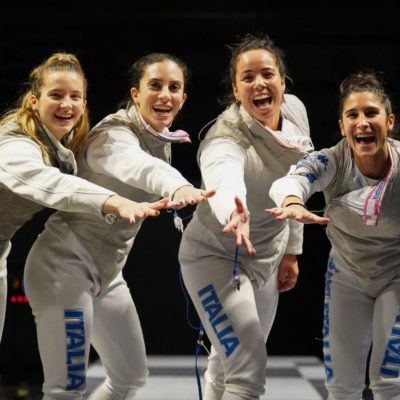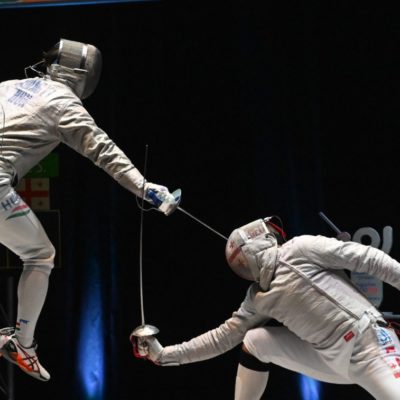Kristina Arvanitis / Staff Writer Winchester Star
While baseball and soccer teams are commonplace athletic activities for pre-teen and teenaged students in town, it’s not often that one breaks out the fencing gear.
But for David Seliger, 14, rapiers and protective gear are a large part of his life and taking up more than just a few hours of time outside school. What started out as a joke and a simple fascination has now turned into a full-fledged sport for David, who spends four to five hours practicing his moves on weekdays and five to six hours at practice and competitions on the weekends.
And the hard work is paying off, as David placed 36th out of 70 in a national fencing event in Kansas City which drew some of the country’s best young fencers in October. And at a competition this month, he just missed the qualifier for the Junior Olympics – by only three spots. But there is plenty of time for him to improve his ranking, as he competed with older and more experienced fencers at the event.
“I gave it everything I had and I was able to pull it off,” David said of his last winning match in the Junior Olympics qualifier against a taller opponent who was ahead of him at the beginning of the match.
How does a young person get interested in a sport like fencing?
For David, it began after a mock fencing competition with his father in New York – only instead of the metal weapons that used to be used in combat, this fencing match featured the neon-colored plastic toothpick sabers often used to skewer maraschino cherries or cocktail wieners.
“It’s not a joke,” David said with a smile. “When I got home, I starting looking up clubs where I could join and learn to fence.”
He then enrolled in the Boston Fencing Club in Waltham, and since then, he has competed in several competitions, pitted against both 10-year-old and 17-year-old opponents. David, now an eighth-grader at Buckingham Brown & Nichols School in Cambridge, began fencing when he was in fourth grade at the Lincoln Elementary School, although he noted that several kids begin fencing as early as seven years old.
David noted that he did try the more common sports like baseball and soccer, but never had much luck or interest in them. When he tells friends and classmates at school about his fencing competitions, it usually elicits one of two reactions.
“Some people think it’s cool and some think it’s not a sport,” he said. But he noted that just learning how to maintain the “en garde” fencing stance is a strain on muscles. In case there was any doubt, fencing is indeed a sport, although David admitted that it was often “80 percent mental.”
David uses an epée when he fences although he started out using a saber, a lighter weapon. He noted that a fencer needs to be taller to use an epée, but that you can hit an opponent anywhere on his body, so it is less precise than fencing with a saber or foil.
David’s mom, Elaine Seliger, remarked that the Boston Fencing Club has nice facilities with a real fencing set-up instead of just a converted gymnasium. She noted that the good thing about joining a club is that beginning fencers do not have to buy their own equipment right away and that young people can try the sport out before deciding whether it is right for them.
“It’s one of those life sports like tennis or golf and I guess that’s what makes it so fun,” Seliger said.
For more information about competitive fencing, visit http://www.usfa.org. The Boston Fencing Club’s Web site can be found at http://www.bostonfencingclub.org. The Winchester Department of Recreation and Community Education also offers beginning and intermediate fencing classes. More information is available at http://www.winrec.com.





